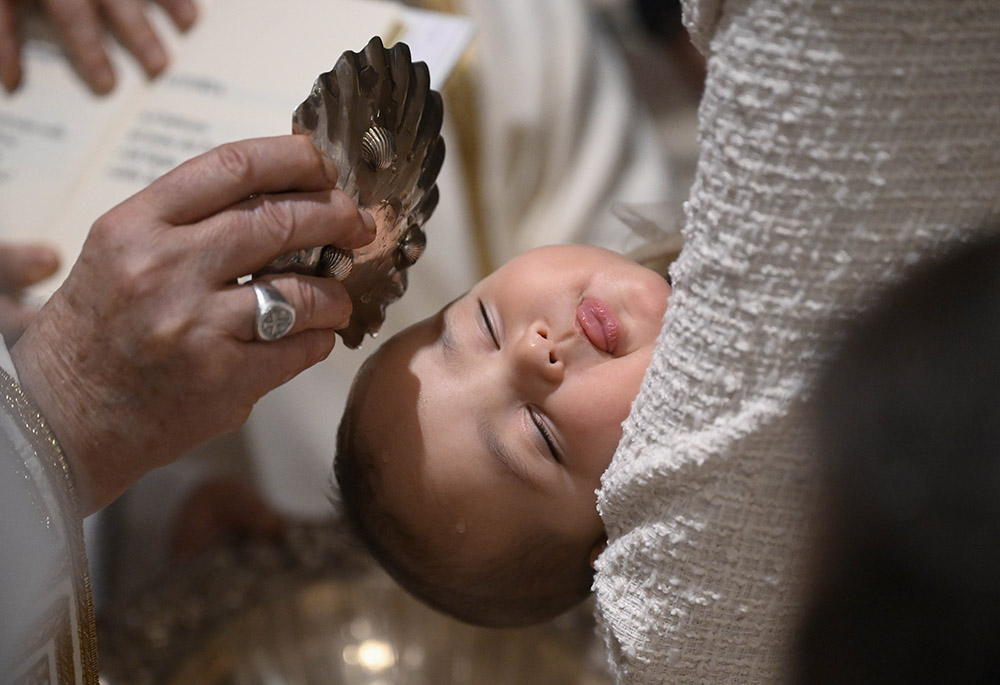
Pope Francis baptizes a baby during Mass in the Sistine Chapel at the Vatican on Jan. 7, 2024, the feast of the Baptism of the Lord. (CNS/Vatican Media)
My dad grew up with two relatives who were eccentric, to say the least. One was an uncle who showed up periodically to sleep on the front porch — often deciding that clothing was an unnecessary inconvenience in hot weather. Another, an aunt who lived outside of the city, would throw stones at Dad and Grandpa when they arrived after making a 10-mile bike ride to bring her food. Dad never talked much about those two. I learned about them from my mom, who knew the stories from her mother-in-law — who was not the blood relative of the folks in question.
I thought about the family response to these characters as I studied the Gospel accounts of Jesus' baptism. All four make a connection between John and Jesus, but only Mark and Matthew admit that Jesus went to John for baptism (Mark 1:9-11, Matthew 3:13-17). John avoids any mention of Jesus' baptism, although in one place (3:22), he says that Jesus baptized others — and shortly thereafter, denied it (4:2). Luke trips over the subject, saying, "After all the people had been baptized and Jesus had also been baptized …" Scripture scholars will tell us that these runarounds assure us that Jesus was baptized by John and that it was an embarrassment to the Gospel writers and their communities. They worried about depicting Jesus as a follower of John.
In contrast to admitting the fact of his baptism, all four Gospels affirm that the Spirit played a part in Jesus' experience and that after his baptism, he, and sometimes others, heard a heavenly voice proclaim that Jesus was God's beloved and deeply pleasing Son. As they tell it, the evangelists all agreed that Jesus' unique relationship with God was the key element of the story. Why did he ask for baptism?
John's baptism called people to metanoia, a change of heart and mind that would prepare them to recognize how God was working among them. Baptism expressed a commitment and a desire
to be ready for the one coming to baptize with the Holy Spirit and fire.
Much to the chagrin of many — then and now — Jesus' baptism reveals that he was an ordinary and deeply religious man who had to grow and pray and seek the movement of the Spirit in his life and in the world around him. Rather than think of him as a divine character pretending to be one of us, we know Jesus as God's image and the model of what human beings can be. Paul's letter to the Philippians (2:5-11) tells us that the divine Son of God abandoned all privilege in order to share the human experience. Like any pious Jew who sought to please God and be among God's faithful, Jesus knew Isaiah's description (42:6) of God's servant who would gently and quietly embody a new covenant between God and humanity. His decision to accept baptism expressed his commitment to fulfill the role to which God called the chosen people.
Advertisement
While Jesus' baptism revealed his simple humanity, the heavenly message he heard singled him out. "You are my beloved Son, with you I am well pleased." What an announcement! Before Jesus had begun any public ministry, he heard the proclamation that he was God's own, and that God was pleased with him.
What must it have felt like to hear that? What kind of faith did it take to believe that he was truly of God? What about him was already pleasing God? In order to explore these questions, Jesus spent a symbolic 40 days alone in the desert wrestling with just how he could fulfill the Father's will in his time and place. Jesus came out of his desert retreat ready to do nothing but incarnate God's love for the world. Some people experienced him as just that, someone in whom they encountered God. Others saw him as a rule-breaking, oft-blasphemous, eccentric.
Eccentric was right on target — and was the basis of other similar labels. Eccentric means "off center," unusual, centered in something different. That's Jesus. Not centered in himself, but on the Father and what the Father loves.
This is where our baptismal commitment comes in. We are baptized into Christ as people pleasing to God, destined to be centered outside ourselves. Baptism aims to free us from what Pope Francis calls "the feverish pursuit of frivolous pleasures." Baptism is supposed to make us eccentric like Jesus, people who get noticed because their behavior falls outside the "norm." This will lead us to be an embarrassment to some and scandalous to others. It will also slowly form us as living members of the body of Christ, human beings becoming all that God hopes we can be.







